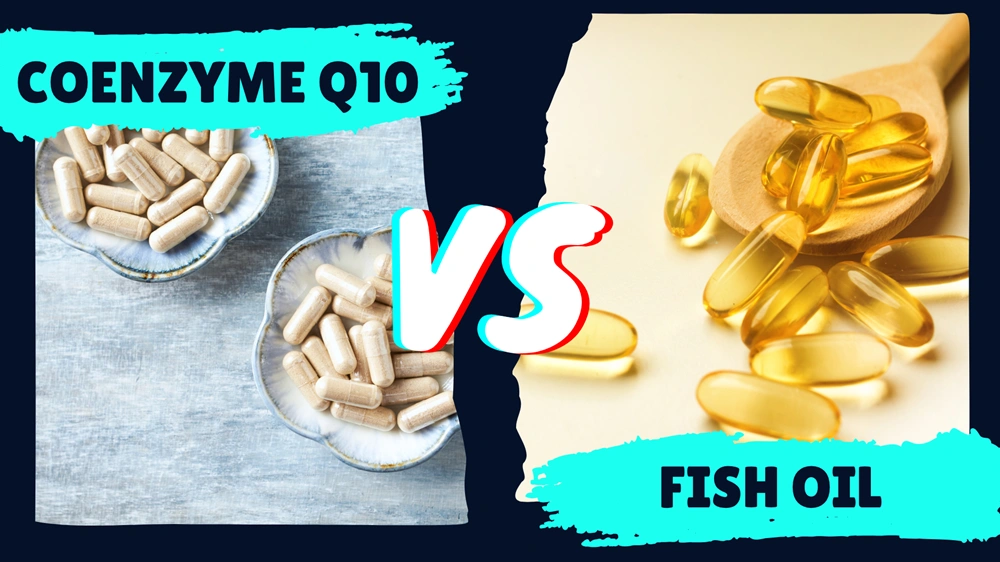Picture this: you’re standing in the supplement aisle, surrounded by bottles promising better health. Two catch your eye—Coenzyme Q10 and Fish Oil. You’ve heard they’re great for your heart, but what do they actually do? Should you pick one, both, or neither? Let’s dive into the world of these two powerhouse supplements to help you decide. We’ll explore what they are, their benefits, how they differ, and when to use them, all while keeping things clear and relatable.

What is Coenzyme Q10?
Coenzyme Q10, or CoQ10, is like the spark plug in your body’s engine. It’s a naturally occurring compound found in every cell, where it plays a starring role in producing energy. Specifically, CoQ10 helps your mitochondria—the tiny powerhouses in your cells—convert food into ATP, the energy currency your body runs on. Without enough CoQ10, your cells might feel like a car running on fumes.
But CoQ10 isn’t just about energy. It’s also a potent antioxidant, shielding your cells from free radicals—those unstable molecules that can damage DNA and contribute to aging and disease. Your body makes CoQ10 naturally, but levels drop as you age or if you take certain medications, like statins for cholesterol. You can find small amounts of CoQ10 in foods like meat, fish, and whole grains, but supplements are often used to boost levels significantly.

Benefits of Coenzyme Q10
Why might you consider adding CoQ10 to your routine? Let’s break it down:
- Heart Health: CoQ10 is a heart’s best friend, especially for those with heart failure. Research, like a study in the Journal of the American College of Cardiology, found that CoQ10 supplementation reduced major cardiovascular events by 39% in heart failure patients. It’s particularly helpful for those on statins, which can deplete CoQ10 levels, leading to muscle aches or fatigue.
- Migraine Relief: If migraines are a frequent unwelcome guest, CoQ10 might help. A study published in Cephalalgia showed that 150 mg of CoQ10 daily reduced migraine days by 48% compared to a placebo. That’s a game-changer for anyone tired of those pounding headaches.
- Antioxidant Power: By neutralizing free radicals, CoQ10 helps protect cells from oxidative stress, which is linked to chronic diseases like diabetes and neurodegenerative disorders. Some studies suggest it may improve insulin sensitivity in people with diabetes, though more research is needed.
- Other Potential Perks: There’s ongoing research into CoQ10’s role in boosting exercise performance and slowing the progression of conditions like Parkinson’s or Alzheimer’s, but the jury’s still out on these.
CoQ10 is like a trusty sidekick, supporting your body’s energy needs and keeping cellular damage at bay. But how does it stack up against Fish Oil?
What is Fish Oil?
Fish Oil comes from the tissues of oily fish like salmon, mackerel, sardines, and herring. It’s packed with omega-3 fatty acids, specifically EPA (eicosapentaenoic acid) and DHA (docosahexaenoic acid), which are essential for your health. Your body can’t make these fats on its own, so you need to get them from food or supplements—making Fish Oil a popular choice for those who don’t eat enough fatty fish.
Think of omega-3s as the oil that keeps your body’s machinery running smoothly. They reduce inflammation, support cell membrane health, and play a critical role in heart and brain function. Fish Oil supplements are often processed through molecular distillation to ensure purity, making them a reliable source of these vital nutrients.

Benefits of Fish Oil
Fish Oil’s claim to fame is its wide-ranging benefits, particularly for your heart and brain. Here’s what the science says:
- Heart Health: Fish Oil is a superstar for cardiovascular health. The American Heart Association recommends omega-3 supplements for people with high triglycerides, as they can lower levels by 20-50% depending on the dose. The REDUCE-IT trial, published in the New England Journal of Medicine, found that high-dose EPA reduced cardiovascular events by 25% in patients with elevated triglycerides.
- Brain Health: Omega-3s, especially DHA, are crucial for brain function. They’re a key component of brain cell membranes and may reduce the risk of cognitive decline and depression. A study in the Journal of Clinical Psychiatry found that omega-3 supplementation can be an effective add-on treatment for major depressive disorder.
- Anti-Inflammatory Effects: Omega-3s help tame inflammation, which can ease symptoms of conditions like rheumatoid arthritis. Research in Health.com notes that Fish Oil may reduce joint pain and stiffness in arthritis patients.
- Other Benefits: Fish Oil may also support eye health, improve liver function, and even enhance skin health by reducing inflammation-related conditions like acne.
Fish Oil is like a soothing balm for your body, calming inflammation and supporting vital organs. But how does it compare to CoQ10?
Coenzyme Q10 vs Fish Oil: What is the Difference?
While both CoQ10 and Fish Oil are celebrated for their health benefits, they work in distinct ways:
- CoQ10 focuses on energy production and antioxidant protection. It’s concentrated in high-energy organs like the heart, liver, and kidneys, ensuring they have the fuel to function optimally. It’s especially helpful for conditions involving energy deficits or oxidative stress.
- Fish Oil provides omega-3 fatty acids that reduce inflammation and support the structural integrity of cell membranes, particularly in the heart and brain. It’s ideal for managing systemic inflammation and improving lipid profiles.
Imagine your body as a busy factory: CoQ10 keeps the power generators running, while Fish Oil ensures the machinery doesn’t overheat. They complement each other, but their applications differ based on your health needs.
Coenzyme Q10 vs Fish Oil Comparison Table
To make the differences clearer, here’s a side-by-side comparison:
| Aspect | Coenzyme Q10 | Fish Oil |
|---|---|---|
| What is it? | Vitamin-like compound, antioxidant, vital for energy production. | Oil from fatty fish, rich in EPA and DHA omega-3 fatty acids. |
| Key Benefits | Supports heart health, reduces migraines, protects against oxidative stress. | Supports heart and brain health, reduces inflammation, lowers triglycerides. |
| Sources | Meat, fish, whole grains, supplements. | Oily fish (salmon, mackerel), supplements. |
| Typical Dosage | 100-200 mg daily. | 1-3 grams daily. |
| Side Effects | Mild digestive issues; may interact with blood thinners. | Fishy aftertaste, digestive issues; high doses may thin blood. |
| Best For | Statin users, heart failure, migraines. | High triglycerides, inflammation, brain health. |
Which is Better for Heart Health: CoQ10 or Fish Oil?
When it comes to heart health, both supplements have unique strengths, and the best choice depends on your specific needs:
- CoQ10 is particularly effective for heart failure patients and those on statins. A study from Cedars-Sinai notes that CoQ10 may improve energy production in heart cells and reduce oxidative stress, potentially lowering the risk of heart-related events. It’s especially helpful for counteracting statin-induced CoQ10 depletion, which can cause muscle pain.
- Fish Oil excels at reducing triglycerides and improving cholesterol profiles. The American Heart Association highlights that omega-3s can lower triglycerides by 20-30% in people with hypertriglyceridemia, and high-dose EPA has been shown to reduce cardiovascular events. Fish Oil also helps lower blood pressure and stabilize heart rhythms.
Research is mixed on their overall impact on heart disease prevention. For example, a 2018 study in the New England Journal of Medicine found no significant reduction in heart attacks from Fish Oil supplements in people without heart disease risk factors. Meanwhile, CoQ10 shows promise in specific heart conditions but lacks broad approval for general heart disease prevention. If you’re choosing based on heart health, Fish Oil may have a slight edge for lipid management, while CoQ10 is better for heart failure or statin-related issues. Combining both could offer comprehensive support, as they target different aspects of cardiovascular health.
When to Use Coenzyme Q10 vs Fish Oil
Choosing between CoQ10 and Fish Oil depends on your health goals. Here’s a guide to help you decide:
- Choose CoQ10 if:
- You’re taking statins, which can deplete CoQ10 levels, leading to fatigue or muscle aches.
- You have heart failure or other heart conditions where energy production is critical.
- You suffer from frequent migraines—studies show CoQ10 can cut migraine days significantly.
- You want to boost cellular energy and protect against oxidative stress.
- Choose Fish Oil if:
- You have high triglycerides or cholesterol levels, as omega-3s are proven to improve lipid profiles.
- You’re looking to reduce inflammation, which can help with conditions like arthritis.
- You want to support brain health, especially cognitive function or mood stability.
- You don’t eat enough oily fish (the American Heart Association recommends at least two servings weekly).
Sarah, a 45-year-old woman on statins, might lean toward CoQ10 to combat fatigue and support her heart. Meanwhile, her friend John, who has high triglycerides and rarely eats fish, might benefit more from Fish Oil. Your healthcare provider can help tailor the choice to your needs.
Can You Take CoQ10 and Fish Oil Together?
Good news: you don’t have to choose just one! Research, including insights from Cedars-Sinai and Dr. Berg, suggests that CoQ10 and Fish Oil can be taken together safely, with no known adverse interactions. In fact, combining them may enhance their benefits, as they target different aspects of health—CoQ10 boosts energy and protects cells, while Fish Oil reduces inflammation and supports lipid health.
Some products even combine both in a single capsule for convenience, often using high-quality dietary supplement ingredients processed through advanced powder manufacturing techniques to ensure purity. However, always check with your doctor, especially if you’re on medications like blood thinners, as Fish Oil can have blood-thinning effects at high doses.
Choosing High-Quality Supplements
When selecting CoQ10 or Fish Oil, quality is key. Here’s how to choose wisely:
- Pure Ingredients: Opt for supplements with minimal fillers or additives. Look for specialty ingredients that ensure high potency and bioavailability.
- Third-Party Testing: Choose brands that test for purity and contaminants, especially for Fish Oil, which should be molecularly distilled to remove toxins.
- Form Matters: For CoQ10, ubiquinol is more bioavailable than ubiquinone. For Fish Oil, check the EPA and DHA content—higher levels are often more effective.
- Reputable Manufacturers: Some companies offer OEM solutions to create tailored supplements, ensuring consistent quality and safety.
Reading labels and researching brands can help you find supplements that deliver real benefits without unnecessary risks.
Conclusion
In the showdown of Coenzyme Q10 vs Fish Oil, there’s no one-size-fits-all winner. CoQ10 is your go-to for boosting cellular energy and protecting against oxidative stress, making it ideal for heart failure, statin users, or migraine sufferers. Fish Oil, with its omega-3 fatty acids, is a champion for reducing inflammation, lowering triglycerides, and supporting heart and brain health.
For many, combining both supplements offers a powerful duo, addressing multiple aspects of health. Whether you’re like Sarah, looking to counteract statin side effects, or John, aiming to manage triglycerides, these supplements can be valuable additions to a healthy lifestyle. Always consult your healthcare provider to ensure they’re right for you, and choose high-quality products to maximize benefits.
FAQs
Why don’t doctors recommend CoQ10?
Some doctors may not recommend CoQ10 due to limited large-scale clinical evidence supporting its benefits for all patients. It’s often suggested for specific conditions like statin-induced muscle pain or heart failure, but not universally endorsed.
What supplement is better than fish oil?
Krill oil is often considered a good alternative to fish oil due to its higher bioavailability and astaxanthin content, which may offer additional antioxidant benefits. Algae oil is another option for vegetarians.
What supplement is better than CoQ10?
No single supplement is universally “better” than CoQ10. Alternatives like ubiquinol (the active form of CoQ10) may be more bioavailable for some people. It depends on your health goals.
What’s better, CoQ10 or fish oil?
Neither is inherently “better.” CoQ10 supports cellular energy and heart health, while fish oil provides omega-3s for heart, brain, and inflammation support. The choice depends on your specific needs.
Is there any downside to taking CoQ10?
CoQ10 is generally safe but may cause mild side effects like stomach upset, nausea, or insomnia in some people. High doses may interact with medications like blood thinners.
Is coenzyme Q10 bad for your liver?
CoQ10 is not typically harmful to the liver and may even support liver health in some cases. However, high doses could potentially affect liver enzymes, so consult a doctor if you have liver issues.
Who cannot take CoQ10?
People on blood thinners (e.g., warfarin), those with low blood pressure, or those allergic to CoQ10 should avoid it or consult a doctor. Pregnant or breastfeeding women should also seek medical advice.
What should you not mix CoQ10 with?
Avoid mixing CoQ10 with blood thinners (e.g., warfarin) or medications for blood pressure without medical advice, as it may enhance their effects and cause complications.
Which supplements should not be taken with fish oil?
Fish oil may interact with blood thinners (e.g., warfarin) or high doses of vitamin E, increasing bleeding risk. Consult your doctor before combining with other supplements.
What is the best vitamin to take with CoQ10?
Vitamin E or vitamin C can complement CoQ10 due to their antioxidant properties, supporting cellular health. A balanced multivitamin may also pair well, but consult your doctor.
References
- Mayo Clinic: Coenzyme Q10
- Healthline: 9 Benefits of Coenzyme Q10
- WebMD: Coenzyme Q10
- Mayo Clinic: Fish Oil
- Healthline: Benefits of Fish Oil
- Harvard Health: Fish Oil
- Cedars-Sinai: Fish Oil and CoQ10
- Natalist: CoQ10 vs Fish Oil for Heart
- American Heart Association: Omega-3 for High Triglycerides
- PubMed: CoQ10 for Migraine Prevention
- New England Journal of Medicine: REDUCE-IT Trial
